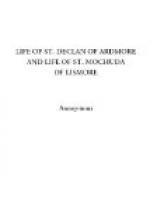Mochuda proceeded till he reached the river Nemh at a ford called Ath-Mheadhon [Affane] which no one could cross except a swimmer or a very strong person at low water in a dry season of summer heat, for the tide flows against the stream far as Lismore, five miles further up. On this particular occasion it happened to be high tide. The two first of Mochuda’s people to reach the ford were the monks Molua and Colman, while Mochuda himself came last. They turned round to him and said that it was not possible to cross the river till the ebb. Mochuda answered: —“Advance through the water before the others in the name of your Lord Jesus Christ for He is the way the truth and the life” [John 14:6]. As soon as they heard this command of Mochuda’s Molua said to Colman, “Which of the two will you hold back—the stream above or the sea below?” Colman answered:—“Let each restrain that which is nearest to him”—for Molua was on the upper, or stream, side and Colman on the lower, or sea, side. Molua said to Colman—“Forbid you the sea side to flow naturally and I shall forbid the stream side.” Then with great faith they proceeded to cross the river; they signed the river with the sign of Christ’s cross and the waters stood on either hand and apart, so that the dry earth appeared between. The side banks of water rose high because there was no passage up or down, so that the ridges were very elevated on both the sea and stream sides. The waters remained thus till such time as all Mochuda’s people had crossed. Mochuda himself was the last to pass over and the path across was so level that it offered no obstacle to foot-passengers or chariots but was like a level plain so that they crossed dryshod, as the Jordan fell back for Josue the son of Nun [Josue 3:17]. Soon as Mochuda had crossed over he blessed the waters and commanded them to resume their natural course. On the reuniting again of the waters they made a noise like thunder, and the name of the place is The Place of Benedictions, from the blessings of Mochuda and his people.




